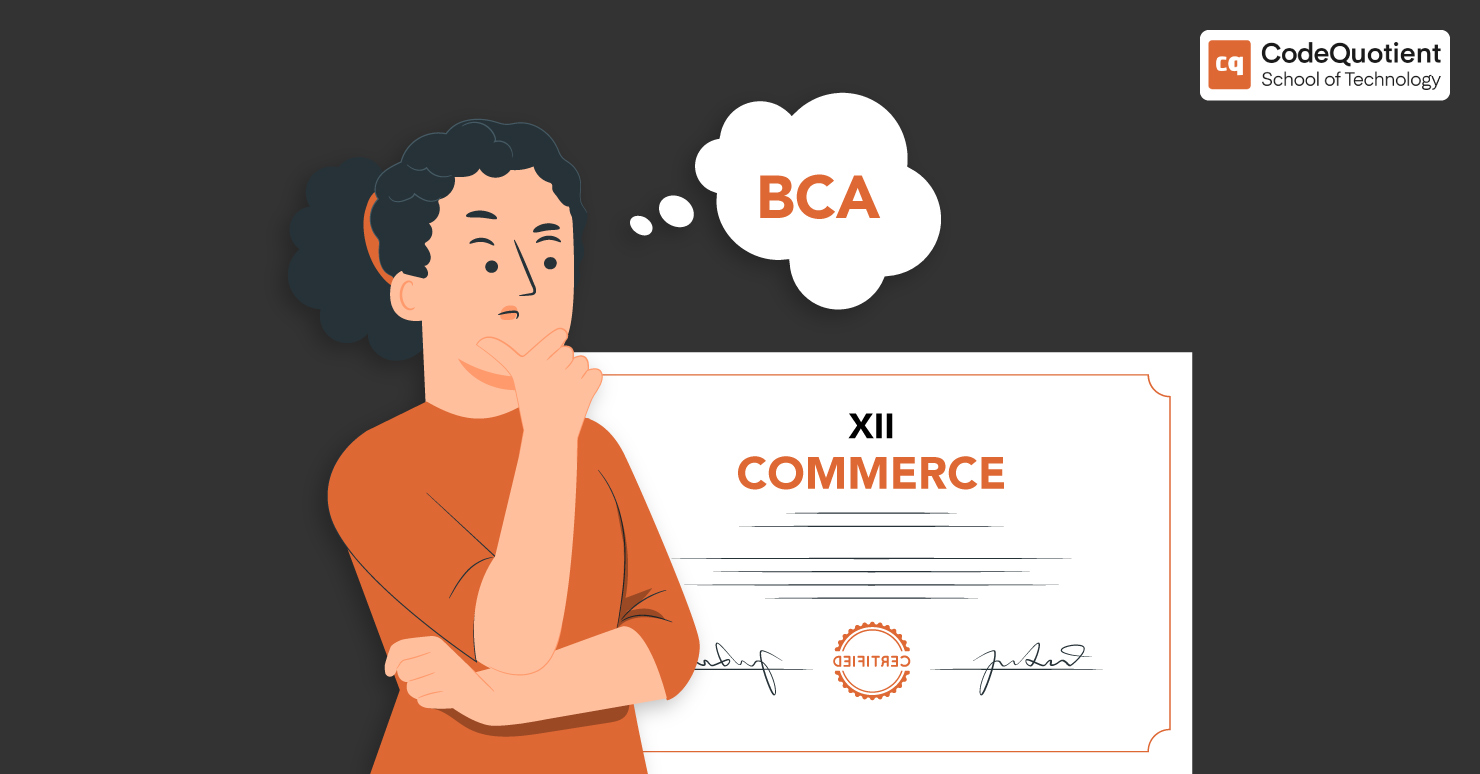Technology’s expansion into every industry has opened up exciting avenues for students to leverage interdisciplinary skill sets spanning technical capacities and domain specialisations like commerce, finance and management. Pursuing a Bachelor of Computer Applications degree or BCA after 12th Commerce can equip students with this powerful combination.
But does opting for a specialised technology degree after commerce in 12th standard make sense? What are the key advantages and potential challenges with this route?
Let’s evaluate the merits of choosing BCA after finishing 12th in the Commerce stream and assess if it catalyses or hinders future information technology career ambitions.
Deconstructing BCA: What Does the Course Entail?

BCA is a dynamic 3-year undergraduate program covering multiple computing and technology dimensions. It provides students with holistic and rigorous training across computer languages, database management systems, networking concepts, programming methodologies, web development frameworks and more.
Curriculum Overview
The BCA curriculum encompasses core subjects like:
- Programming Languages: Equipping students with coding capabilities across widely used languages like C, C++ and Java to develop applications, software programs and tools.
- Operating Systems: Enabling OS installation, management, evaluation and design capacities across systems like Unix, Linux and Windows through lab work.
- Data Structures and Algorithms: Building competency with core frameworks like arrays, linked lists, stacks, queues, trees, searching and sorting to architect computational solutions.
- Web Development Technologies: HTML, CSS, JavaScript, PHP and MySQL to architect full-stack web apps and websites.
- Mathematical Foundations for Computing: Math topics like Discrete Mathematics, Probability, Linear Algebra and Statistics are crucial prerequisites for coding and quant-based analysis tasks.
Eligibility and Duration
The minimum eligibility is passing the 12th standard with Mathematics or Business Mathematics as a core subject. Students must secure a minimum percentage – usually between 50% to 60% across colleges and programs. The BCA degree spans three academic years divided into six semesters.
Advantages of Pursuing BCA After 12th Commerce
Here is why pursuing BCA after 12th Commerce could be your gateway to a compelling career:
1. Enhanced Prospects in IT Industry Roles
BCA furnishes students with globally valued technical competencies tailor-made for specialised IT positions like software programmers, web developers, database administrators, system analysts, etc. These roles display consistent industry demand and lucrative pay scales – incentivising digital skilling.
2. Development of Crucial Technical Skills for BCA after 12th commerce
Programming, data science, and analytics capacities will serve as career-enabling competitive differentiators as more business processes increasingly undergo digitisation and automation across sectors. BCA allows commerce students to be future-ready.
3. Integration of Technology in Commerce-Related Fields
Managerial, financial, accounting and analytical commerce strengths get supplemented through technological implementation capacities via coding, system design and database administration skills – widening career possibilities.
4. Potential for Higher Education and Specialisation
BCA graduates can undertake more advanced competency building through master’s degrees like MCA, MSc IT or MBA in Systems, IT Consulting, Business Analytics, etc., to access leadership tracks.
Some Major Drawbacks of Pursuing Traditional BCA After 12th Commerce
However, traditional BCA courses may not align well with every 12th commerce student’s career visions and innate strengths. So, the following aspects require deliberation before taking the BCA degree after 12th commerce:
1. Shift Away from Commerce-Focused Education
Students with a singular interest in commerce may find 3 years devoted exclusively to technology training tangential from the intended specialisation area. The abrupt shift can be disconnected.
2. Steep Learning Curve in Technical Domains
Coding and systems development curricula can be challenging without a proper mindset, quantitative aptitude, logical thinking abilities, and problem-solving determination.
3. Potential Disparity in Skill Sets for Commerce-Based Careers
Those pursuing purely accounting, financial analysis, marketing, and HR-centric corporate tracks in the future may find several components of BCA redundant or underutilised for intended commerce careers.
However, CodeQuotient School of Technology’s BCA+UGP SE is strategically crafted to alleviate these challenges. With a curriculum tailored for commerce graduates stepping into the tech world, we ensure a smoother transition.
Through personalised mentorship, focused skill development modules, and real-world projects, our BCA program bridges the gap between commerce and technology, alleviating the steep learning curve and fostering a holistic skill set poised for success in the IT industry.
Job Opportunities Post BCA for Commerce Students
By gaining knowledge across technology implementation and managerial and financial business contexts, completion of BCA after 12th commerce has an expansive range of job profiles to target across sectors.
1. Software Developer/Programmer
Armed with coding capacities in languages like C++, Java, and Python and competency in software development methodologies, Software Developers architect, build, run and maintain custom applications, programs and scripts for diverse organisational needs.
They collaborate with business teams to translate requirements into technical solutions. Testing skills and creativity in resolving bugs are imperative.
2. Database Administrator
Database Administrators handle the crucial task of installing, configuring, upgrading, monitoring, securing, and overall managing organisational database systems and powering operations.
Whether SQL-based relational databases or NoSQL alternatives, DBAs optimise data models, migrate legacy schemas to modern formats, boost query and retrieval speeds through indexing strategies and provide troubleshooting assistance across teams to smooth data bottlenecks.
3. Web Developer
Web Developers bring websites, web applications and interactive online platforms to life using a varied technology stack. It spans from HTML, CSS, and JavaScript libraries like React, Angular or Vue to impart responsive and dynamic front-end experiences integrated with custom backend logic and database integrations coded in Python, Ruby, PHP, etc.
4. Systems Analyst
Systems Analysts reside at the intersection of business objectives and technical capacities – leveraging their dual-domain perspective to analyse infrastructure requirements and existing system health, diagnose performance bottlenecks and design integrated solutions spanning software, hardware and network specifications to address the problem scope.
5. Network Administrator
Network Administrators handle backend infrastructure projects focused on installing, configuring, upgrading and monitoring communication networks within organisations to enable smooth connectivity and access across devices and applications for employees and customers.
Salary Range
Starting salaries for these roles span between INR 3 lakhs to INR 6 lakhs per annum, with higher average pay scales associated with software development, product and data science positions that leverage complex coding capacities.
Is BCA the Bridge You’ve Been Searching For?
Pursuing a BCA after 12th Commerce can be a lucrative direction for students aiming for careers intersecting technology with business and finance. With both sets of skills, they can gain a competitive edge in the job marketplace.
However, the decision requires evaluating individual strengths and interests. Students keen to remain deeply entrenched in core commerce topics may find the technical shift too drastic.
CodeQuotient School of Technology’s Bachelor of Computer Application (BCA)+ UG program in Software Engineering is an exciting option worth exploring for its industry-oriented training approach.
With specialised tracks in AI/ML, Full Stack Development, and Cloud Computing, along with up to 1.5 years of paid internship and potential fee sponsorship, this program is designed to shape future IT pioneers.
To explore more about this program’s offerings, get in touch with us today!




